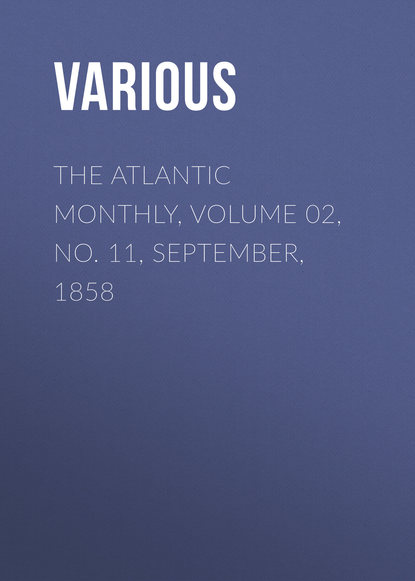По всем вопросам обращайтесь на: info@litportal.ru
(©) 2003-2024.
✖
The Atlantic Monthly, Volume 02, No. 11, September, 1858
Автор
Год написания книги
2018
Настройки чтения
Размер шрифта
Высота строк
Поля
The old man answered slowly, for his breathing was difficult and often painful.
"It is an old story,—old as the dried f-flowers that Mildred told me of,—but it had a f-fragrance once. Yer-your mother, Mark, was as per-pretty a girl as you'd often see. Walter Kinloch ler-loved her, and she him. He sailed to the Indies, an' some der-diff'culty happened, so that the letters stopped. I d-don't know how 'twas. But arter a while sh-she married your father. Mr. Kinloch, he m-married, too; but I guess he nun-never forgot the girl of his choice."
Mark grasped his young wife's hand, at this tale of years gone by.
"The lock of hair and the rose were your mother's, then!" she whispered. "Dear father! faithful, even in death, to his friends, and to the memory of his first love! How much suffering and crime would have been prevented, if he could only have uttered the words which his heart prompted!"
"God forgive the woman!" said Mr. Hardwick, solemnly. None knew then how much she had need of forgiveness, standing as she was on the brink of that last fatal plunge!
Mr. Alford suggested that the fatigue of talking would wear upon the enfeebled man, and advised that he should be left to get some rest, if possible.
"To-morrow is S-Sabba'-day, ef I've counted right," said Mr. Hardwick.
"I sh-should like to see the sun on the st-heeple once more."
"Dear uncle, I hope you may see it a great many times. We must leave you to rest."
"Good-night, mum-my children," he replied. "God b-bless you all! Let me put my hands on your h-heads."
They knelt by his bedside, and he blessed them fervently. Mr. Alford and Lizzie remained to attend upon him, and the others withdrew.
The night passed, how wearily! None could sleep, for through all the air there was a presage of sorrow, a solemn "tingling silentness," to which their senses were painfully alive. Who, that has passed the interminable gloomy hours that preceded the departure of a loved and venerated friend into the world of spirits, does not remember this unutterable suspense, this fruitless struggle with eternal decrees, this clinging of affection to the parting soul? What a sinking of the heart even the recollection of such a scene produces!
The day dawned upon sleepless, tear-stained eyes. The dying man was conscious, cheerful, and calmly breathing. In the adjoining room the family sat beside the table on which was spread their untasted breakfast.
The bell began to ring for meeting. Mr. Hardwick roused up at the sound, and called for his children. He blessed them again, and placed his hands on their bowed heads in turn. He thought of the psalms which he had so often led, and he asked all to join in singing Billings's "Jordan."
"There is a land of pure delight,
Where saints immortal reign;
Infinite day excludes the night,
And pleasures banish pain."
With faltering voices they sang the triumphal hymn. The old man's eyes were fixed upon the steeple, which pointed upward through the clear air, and shone in the golden light of the sun. He kept time with a feeble movement, and once or twice essayed to raise his own wavering voice. A smile of heavenly beauty played over his pallid features as the music ceased,—a radiance like that crimson glow which covers the mountain-top at dawn. He spoke almost inaudibly, as if in a trance; then repeating with a musical flow the words of his favorite author,
"Where the bright seraphim in burning row
Their loud uplifted angel-trumpets blow,
And the cherubic host in thousand choirs
Touch their immortal harps of golden wires,
With those just spirits that wear victorious palms
Hymns devout and holy psalms
Singing everlastingly,"—
his voice sank again, though it was easy to see that a prayer trembled on his lips. As a strain of music fades into silence, his tones fell away, fainter and fainter; and with the same seraphic light on his countenance his breathing ceased.
THE BIRTH-MARK
A.D. 12—
See, here it is, upon my breast,—
The bloody image of a hand!
On her white bosom it was pressed,
Who should have nursed—you understand;—
I never yet have named her name,
Nor will I, till 'tis free from shame.
The good old crone that tended me
Through sickly childhood, lonely youth,
Told me the story: so, you see,
I know it is God's sacred truth,
That holy lips and holy hands
In secrecy had blessed the bands.
And well he knew it, too,—the accursed!—
To whom my grandsire gave his child
With dying breath;—for from the first
He saw, and tried to snare the wild
And frightened love that thought to rest
Its wings upon my father's breast.
You may have seen him riding by,—
This same Count Bernard, stern and cold;
You know, then, how his creeping eye
One's very soul in charm will hold.
Snow-locks he wears, and gracious art;
But hell is whiter than his heart.
Well, as I said, the secret rite
Had joined them, and the two were one;
And so it chanced, one summer night,
When the half-moon had set, and none
But faint star-shadows on the grass
Lay watching for his feet to pass,
Led by the waiting light that gleamed
From out one chamber-window, came
The husband-lover;—soon they dreamed,—
Her lips still murmuring his name
In sleep,—while, as to guard her, fell
His arm across her bosom's swell.
The low wind shook the darkened pane,
The far clock chimed along the hall,
There came a moment's gust of rain,
The swallow chirped a single call
From his eaves'-nest, the elm-bough swayed
Moaning;—they slumbered unafraid.
Without a creak the chamber-door











